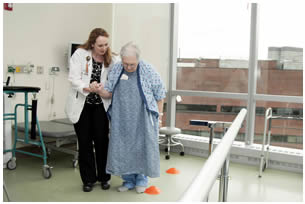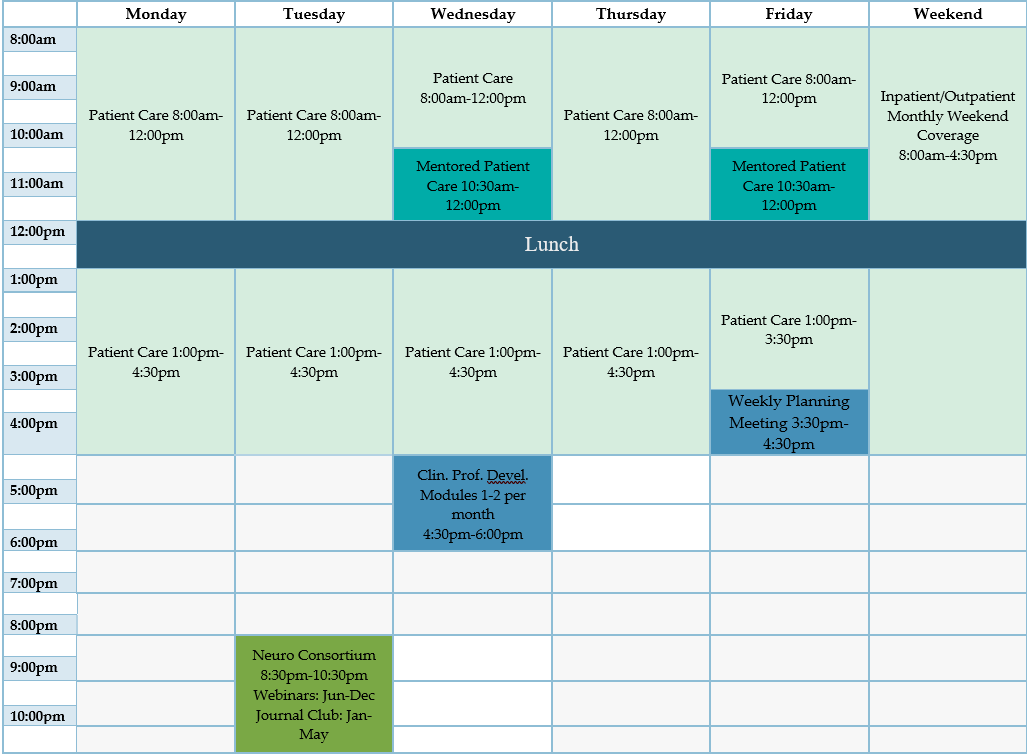Physical Therapy Services Neurologic Residency
 Massachusetts General Hospital is proud to offer a clinically based neurologic residency program that is designed to advance a physical therapist’s knowledge, decision-making and skills towards that of an expert neurological practitioner. This 15-month accredited program will also prepare the participants to sit for the ABPTS neurologic certification examination. The program begins in June with the didactic component and continues with a twelve-month clinical component starting in September of the residency year. Through mentored and non-mentored practice, residents will develop their skills working with patients with acute, subacute, and chronic neurologic disorders during two six-month rotations in Mass General’s inpatient acute and outpatient settings.
Massachusetts General Hospital is proud to offer a clinically based neurologic residency program that is designed to advance a physical therapist’s knowledge, decision-making and skills towards that of an expert neurological practitioner. This 15-month accredited program will also prepare the participants to sit for the ABPTS neurologic certification examination. The program begins in June with the didactic component and continues with a twelve-month clinical component starting in September of the residency year. Through mentored and non-mentored practice, residents will develop their skills working with patients with acute, subacute, and chronic neurologic disorders during two six-month rotations in Mass General’s inpatient acute and outpatient settings.
As an employee of Mass General, residents work 36 hours per week and receive a full benefits package. In addition to the paid hours, residents receive an average of 4 hours of one-on-one clinical mentoring per week with faculty that are expert clinicians and experienced clinical teachers. Faculty resources include over 25 therapists with ABPTS certification in neurology as well as over 60 staff members who have board certification in five other specialty areas.
The didactic portion of the program is provided by the Neurologic Physical Therapy Professional Education Consortium. The NeuroConsortium provides 26 evening webinars, a library of pre-recorded webinars, a journal club, and one four-day on-site experience held in California during November of the residency year. This curriculum provides the opportunity for residents to learn from nationally recognized experts and leaders in neurologic PT, as well as interact with other residents from across the country.
We believe that graduates of this residency will be well prepared to meet the neurologic patient’s complex needs with a holistic, patient-centered approach as well the skills needed to be educators and leaders in physical therapy. We are proud that 100% of our residents have successfully completed the program. After graduation, 100% of our graduates have gone on to pass the ABPTS Exam to become Board Certified Neurologic Clinical Specialists.
Program Mission/Goals
Mission
 The mission of Mass General Physical Therapy Services Neurologic Residency Program is to develop advanced practitioners in neurologic physical therapy who will provide specialized, holistic, and compassionate care that maximizes the neurologic patient’s outcomes. Excellence is demonstrated through the application of evidence-based decision making and strong collaboration with patients, families and interprofessional colleagues. Participation in structured and progressive didactic and clinical experiences and a variety of research, teaching, and community service activities will prepare the advanced practitioner to influence and contribute to the physical therapy profession and achieve specialty certification. The program will graduate physical therapists that support and uphold the mission, vision, and values held by Mass General.
The mission of Mass General Physical Therapy Services Neurologic Residency Program is to develop advanced practitioners in neurologic physical therapy who will provide specialized, holistic, and compassionate care that maximizes the neurologic patient’s outcomes. Excellence is demonstrated through the application of evidence-based decision making and strong collaboration with patients, families and interprofessional colleagues. Participation in structured and progressive didactic and clinical experiences and a variety of research, teaching, and community service activities will prepare the advanced practitioner to influence and contribute to the physical therapy profession and achieve specialty certification. The program will graduate physical therapists that support and uphold the mission, vision, and values held by Mass General.
Goals
- To prepare residents to be physical therapists who provide compassionate, high quality, evidence-based care to patients with neurologic disorders with emphasis on developing skill in examining and evaluating the movement system (including diagnosis and prognosis) in order to implement interventions that achieve optimal outcomes for patients with neurologic disorders.
- To develop the resident's ability to improve patient outcomes through interprofessional, team-based, collaborative approaches.
- In 3 years following graduation, graduates demonstrate continued growth in the profession.
- The program is sustainable.
- Maintain ABPTRFE accreditation.
Curriculum
Clinical:
Resident will provide clinical care as a Mass General staff member for 36 hours per week including:
- Two separate six-month rotations on the inpatient acute and outpatient services
- Minimum of 150 hours (3 hours per week) of 1:1 mentoring from an experienced ABPTS certified neurologic specialist
Didactic:
The primary didactic component of the program is provided by the Neurologic PT Professional Education Consortium Curriculum, including:
- 26 evening webinars (June through December)
- A library of pre-recorded webinars
- One four-day on-site clinical experience in Los Angeles, California during November
- Online Journal club
Admissions

Application Process:
- Submit application through RF-PTCAS
Program Costs:
- Didactic component: $2400 paid directly to the Neurologic PT Professional Education Consortium. Residents are responsible for all travel-associated costs for onsite portions of this component.
- Clinical component: $2250 paid to Mass General Physical Therapy Services
FAQs
What do you see as the unique aspects of your residency program?
We are an exceptionally strong, clinically based program with extensive resources. The resident will have an opportunity to work with a very wide range of complex neurologic patients on each of their six-month rotations as well as with 20 board certified neurologic clinical specialists who are part of our staff. Our faculty has extensive experience to mentor residents and facilitate their growth at whatever point they are along the novice to expert continuum.
Can you describe the didactic portion of your curriculum?
The primary didactic component of the residency will be provided by the Neurologic Physical Therapy Professional Education Consortium. The residents participate in weekly webinars from June-December and attend one four-day on-site experience at USC in California. Beginning in January, the residents will participate in online case presentations through the Neuroconsortium online platform where they will have an opportunity to explore the current literature as it relates to patient cases.
In addition, the Neuroconsortium didactic component will be supplemented by a Clinical and Professional Development Series at Mass General. This series includes modules on novice to expert practice, clinical decision making, teaching and learning theory, and interprofessional practice, as well as modules that focus on clinical knowledge and skills, such as neuroanatomy, cranial nerve testing, and management of spinal cord injury. We will also use this series to supplement the development of clinical skills and decision making around complex diagnoses.
How long is your program and how is it organized?
The program covers a period of 15 months. The didactic component, consisting of weekly evening webinars, begins in June. The clinical portion begins in September and is divided into 6-month rotations on the inpatient acute and outpatient services. The switch between settings occurs in March.
Do you accept new graduates into your program?
Yes. We do ask that applicants have had at least one 10-week full time clinical experience with neurologic patients as part of their entry level training. New graduates must have a Massachusetts PT license prior to starting the clinical component in September.
What do you see as essential characteristics of a successful resident in your program?
Residents should come with a commitment to patient centered practice as well as the ability to articulate a clinical framework for decision making. They need to demonstrate evidence of self-initiative, self-assessment, and reflective skills. Strong communication and collaboration skills with patients, family and other team members are important qualities for success in this dynamic environment.
What does a typical week look like for a resident in your program?
Residents work 36 paid hours per week as a Mass General staff therapist and typically have four additional hours per week of one-to-one time with the clinical mentor. They also participate in 26 weekly evening webinars from June to December and online Journal club through the Neurologic PT Professional Education Consortium from January through May. Additional didactic content is provided at Mass General through a Clinical and Professional Development Series that is offered once or twice per month. We anticipate that the amount of time needed to complete both the didactic and clinical components of the residency will average 50 hours per week.

Are there opportunities for research activities within the residency?
Application of the evidence to justify evaluation and intervention choices for patients is a foundational skill of this residency. Residents will both participate and present in a case conference format where a research question will be developed and specific literature will be critically appraised as to its applicability to a patient case. Residents will complete an evidence based practice project in conjunction with a presentation at an inpatient neuro team Case Conference.
Can the residency help me find housing?
We are able to provide recommendations for housing options, but it is the responsibility of each resident to arrange for housing. As a Mass General employee, you will have access to information about housing as well as public transportation options. Please consider that the Boston rental market is tight and fast moving.
How many residents do you accept each year?
Historically, we have accepted two residents every year into our program. We may consider accepting additional residents at some point in the future.
Would it be possible to communicate with current or prior residents from your program?
Yes. Please reach out to the program director for contact information.
Contact

Emily Smith-Sturr, PT, NCS
Board-Certified Neurologic Clinical Specialist
Director, PT Services Neurologic Residency
Director of Clinical Education, PT and OT Services
Massachusetts General Hospital
15 Parkman Street | Wang 134
Boston, MA 02114
617-724-0128
esmith-sturr@partners.org
Our Commitment to Diversity
Mass General provides a welcoming and supportive environment for employees of all ethnic backgrounds, ages, lifestyles and physical abilities.
Professional Training at Mass General
Mass General offers specialized residencies and fellowships in each of our multidisciplinary care centers and clinical departments.
